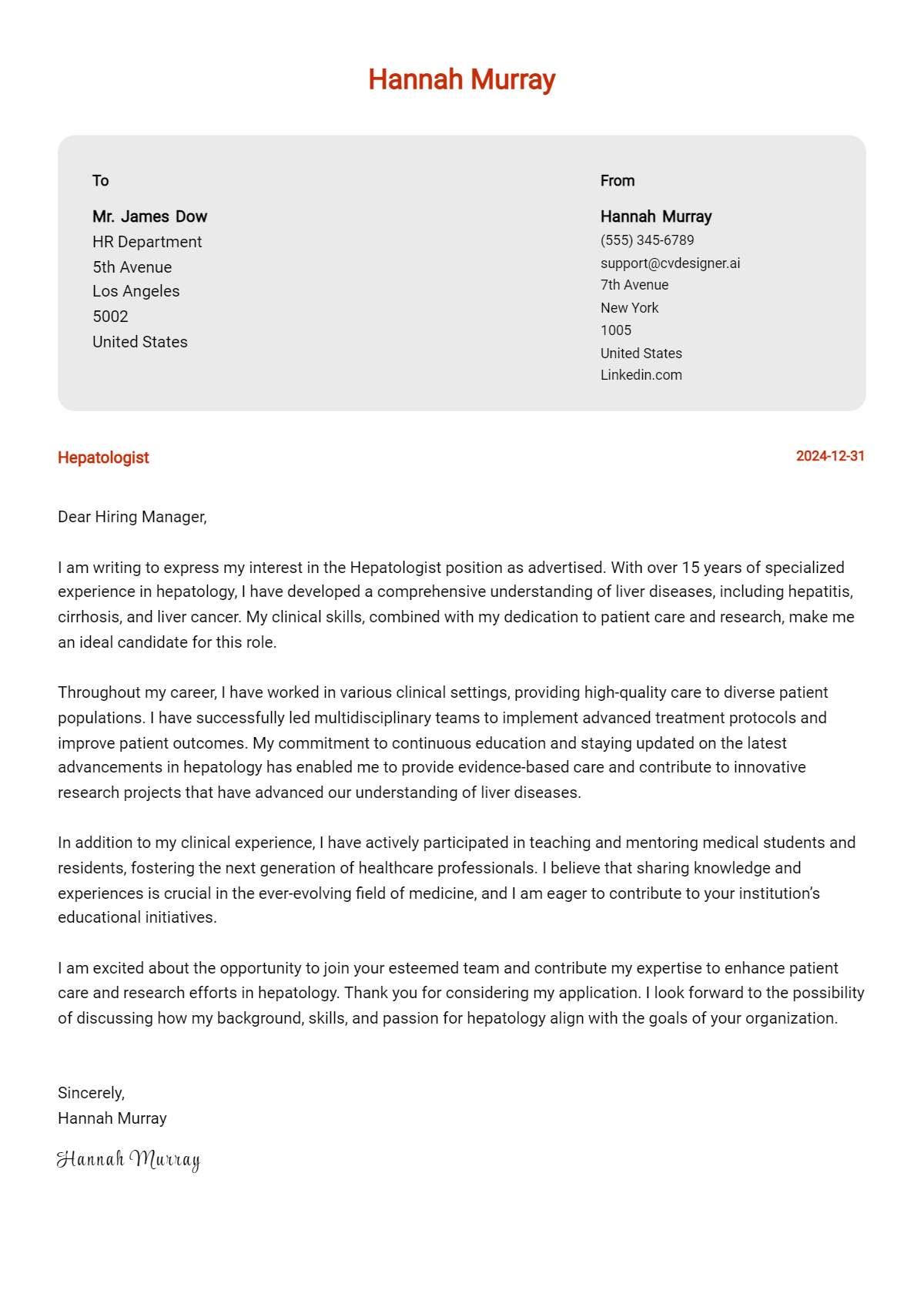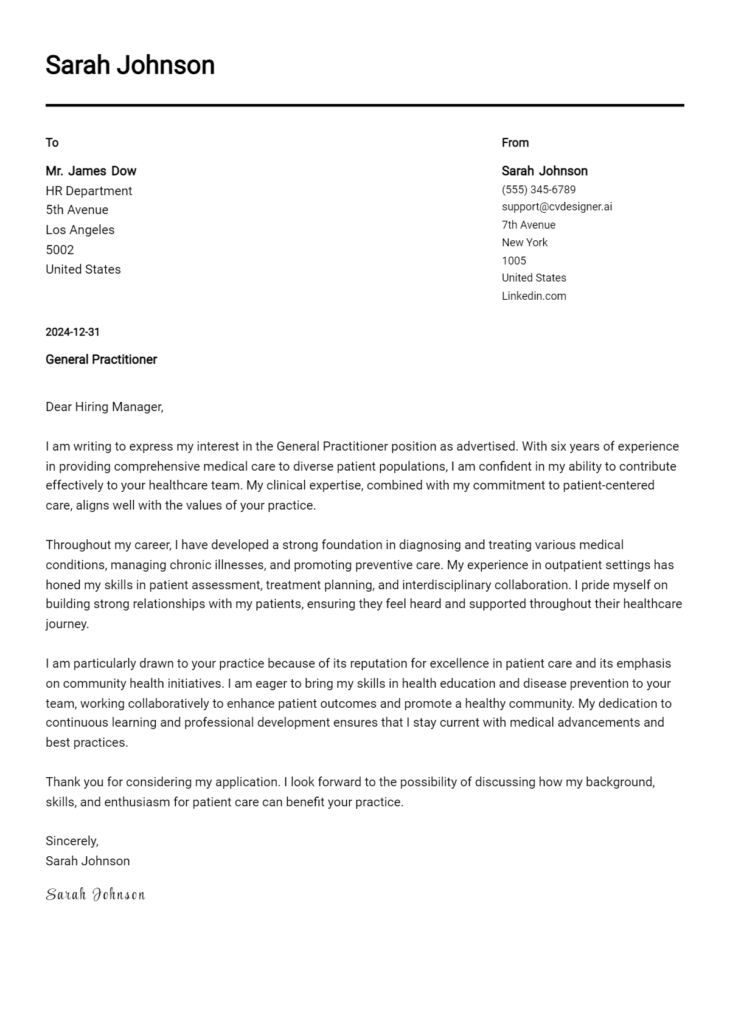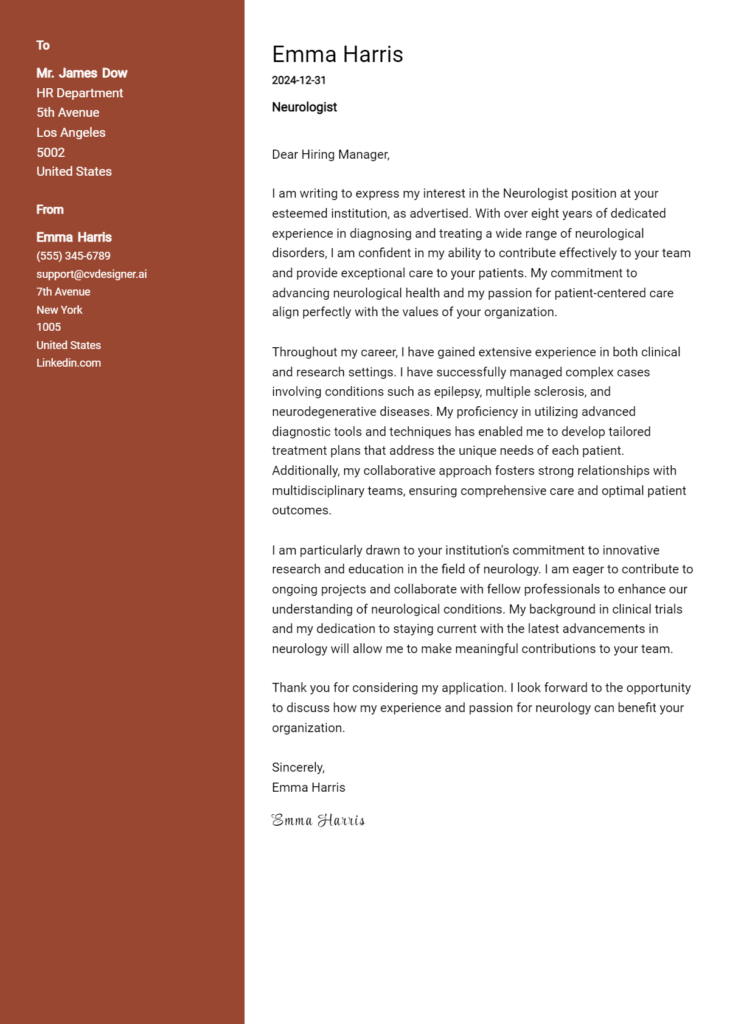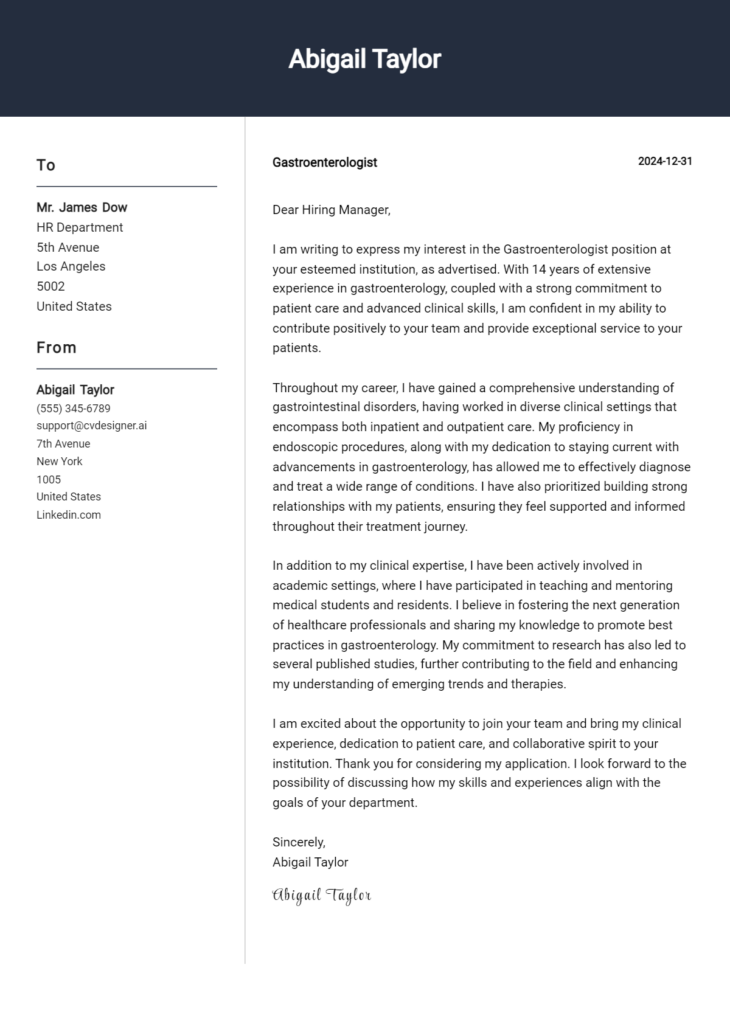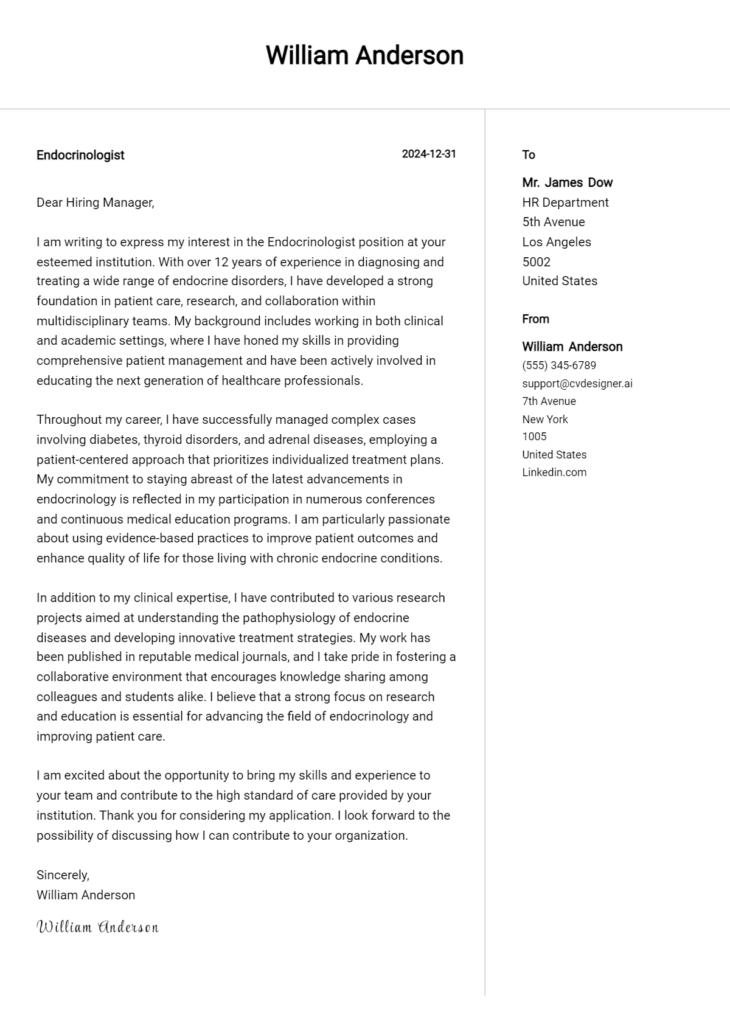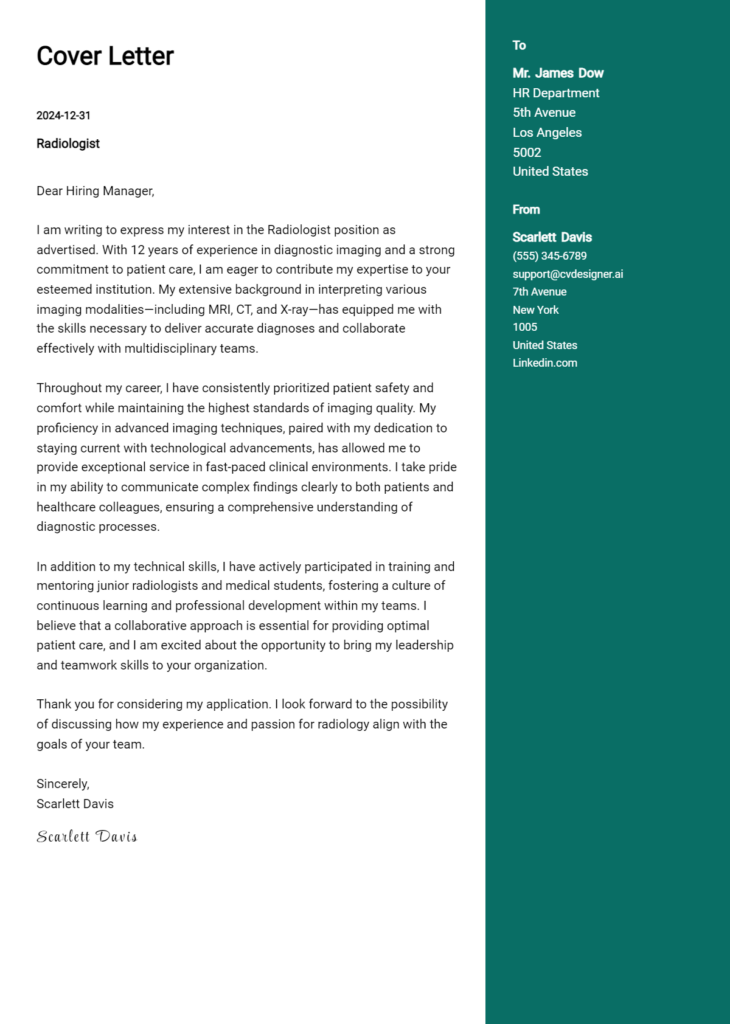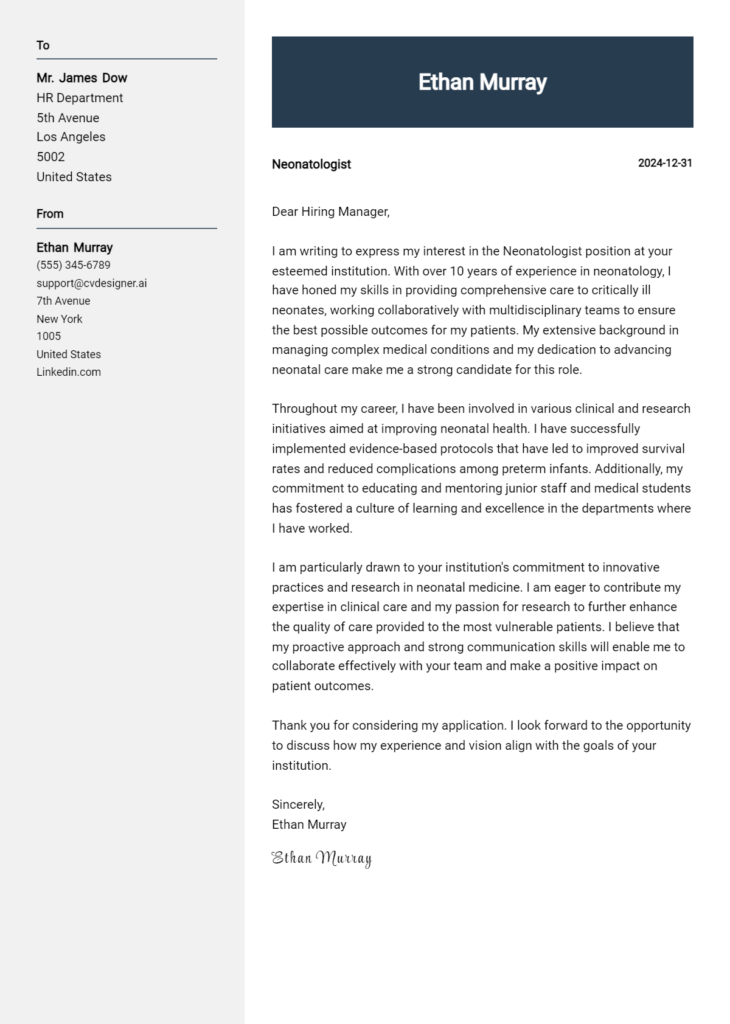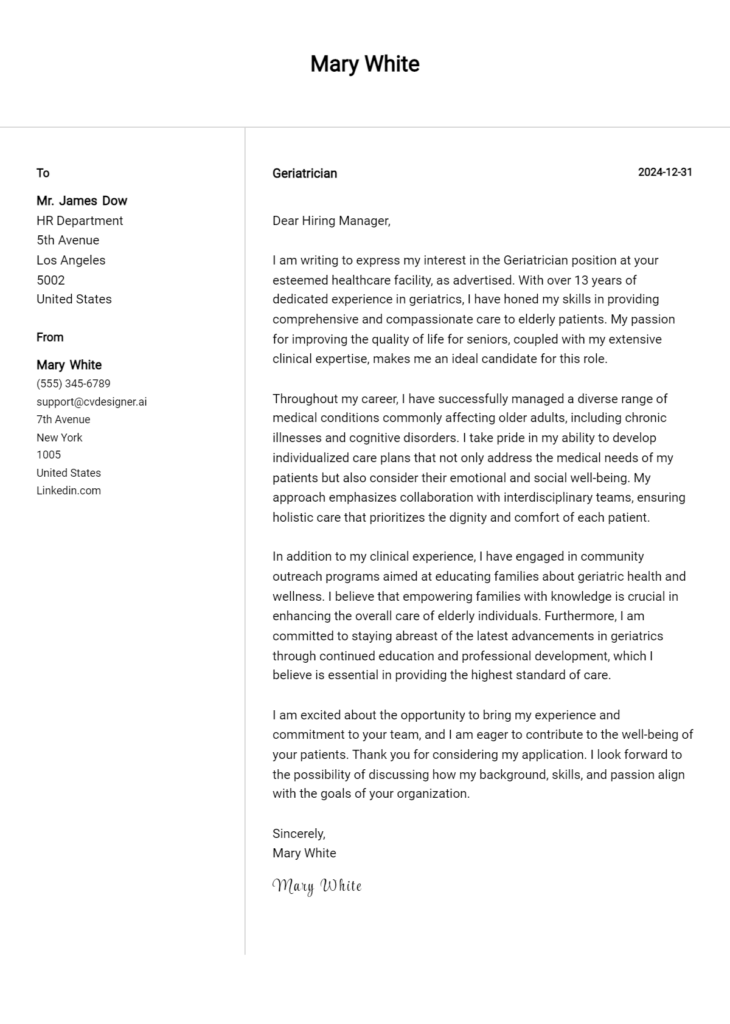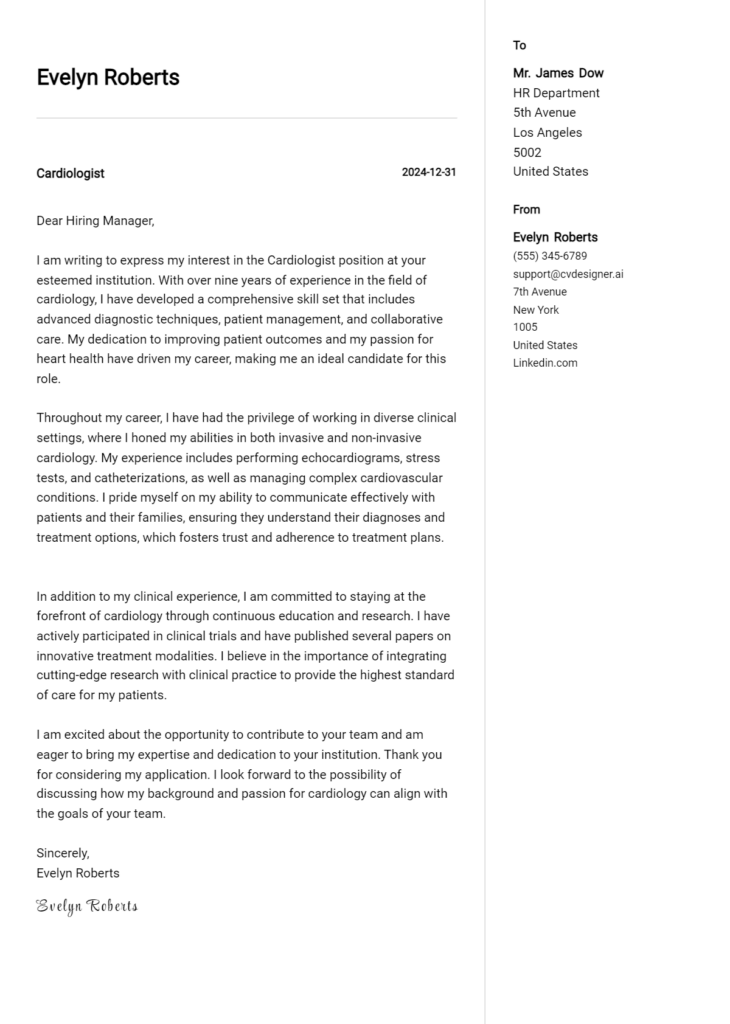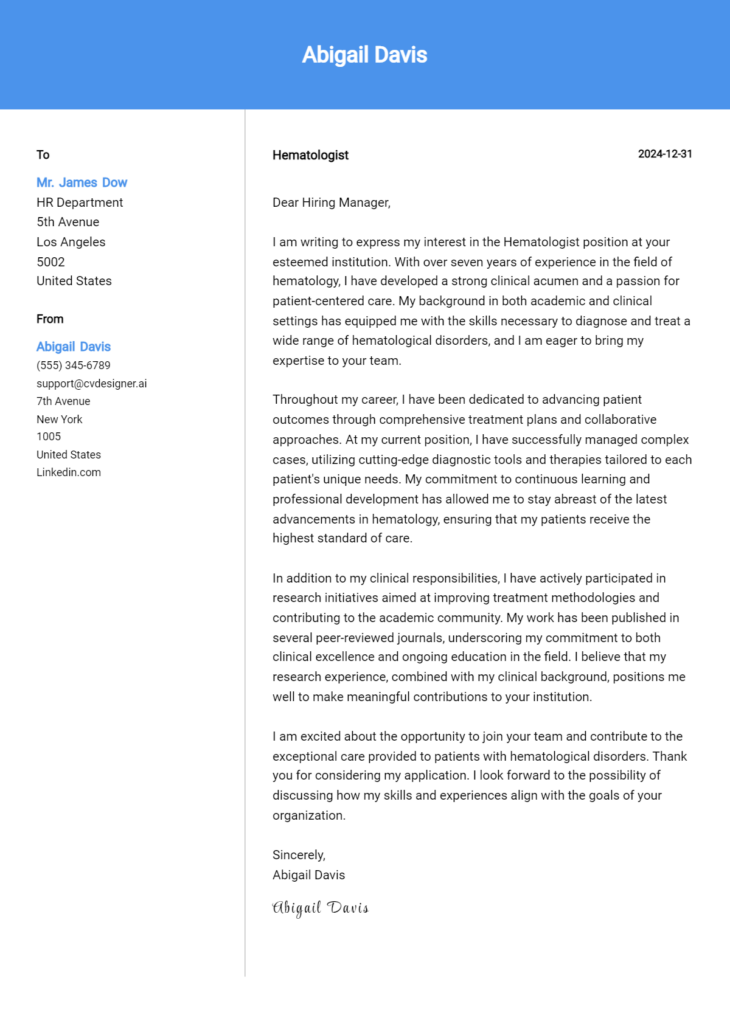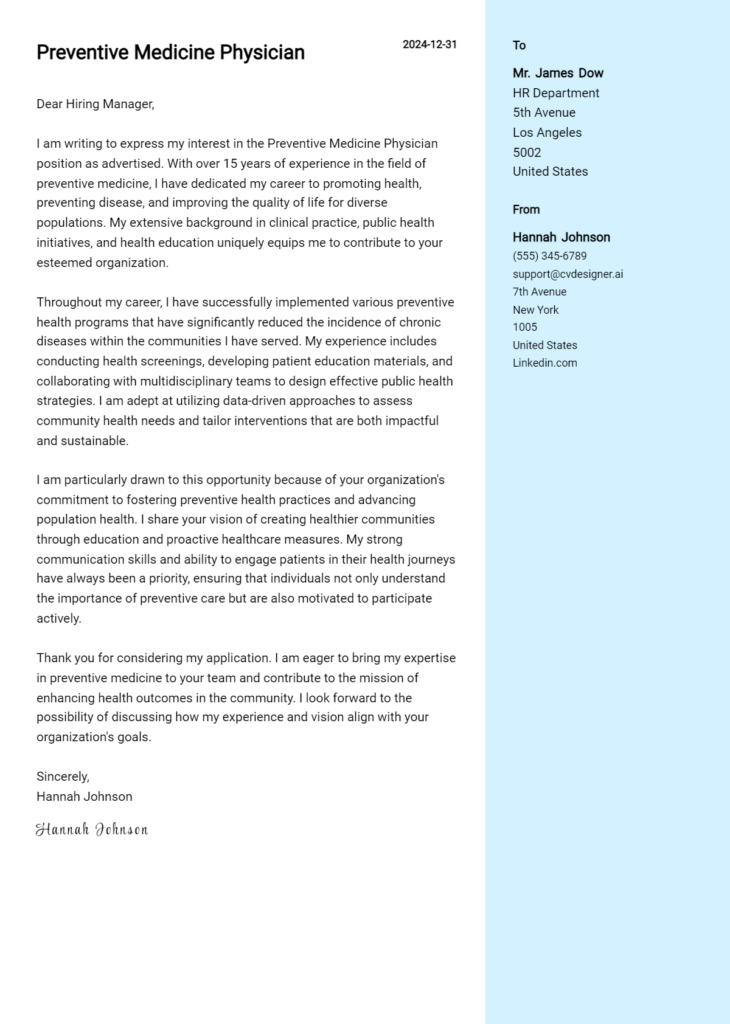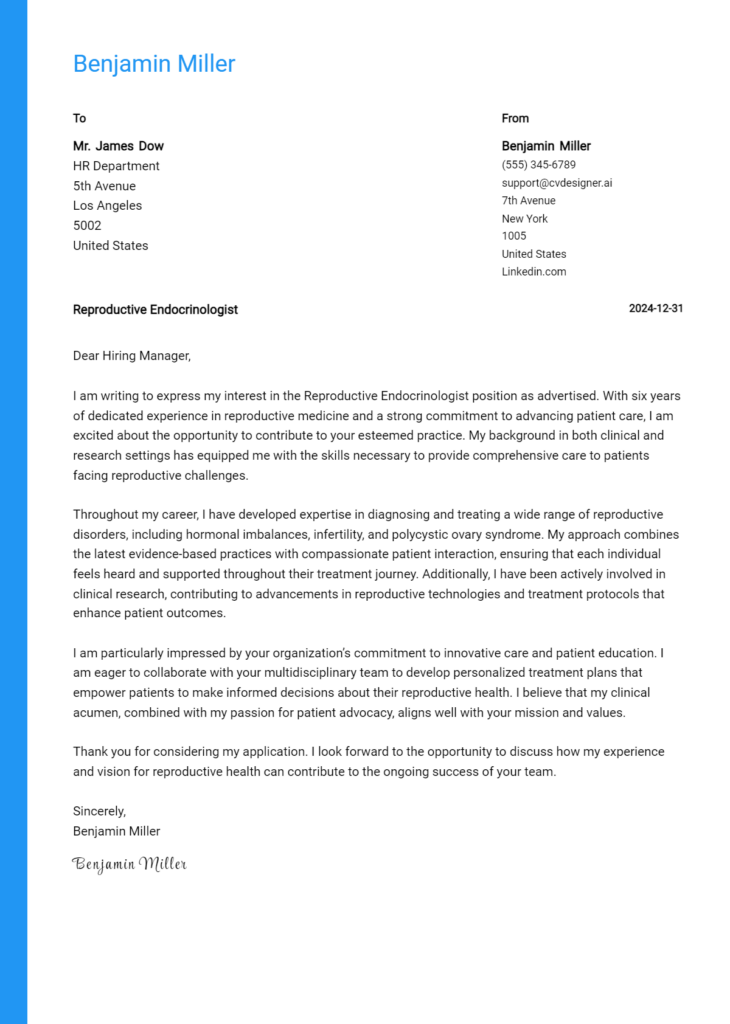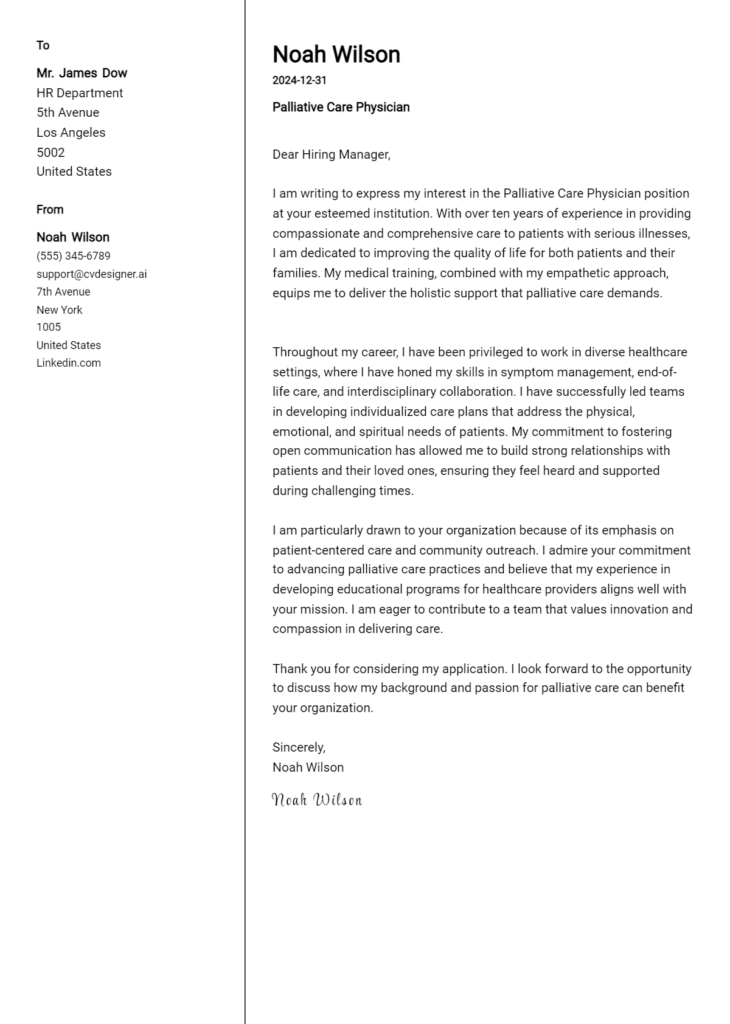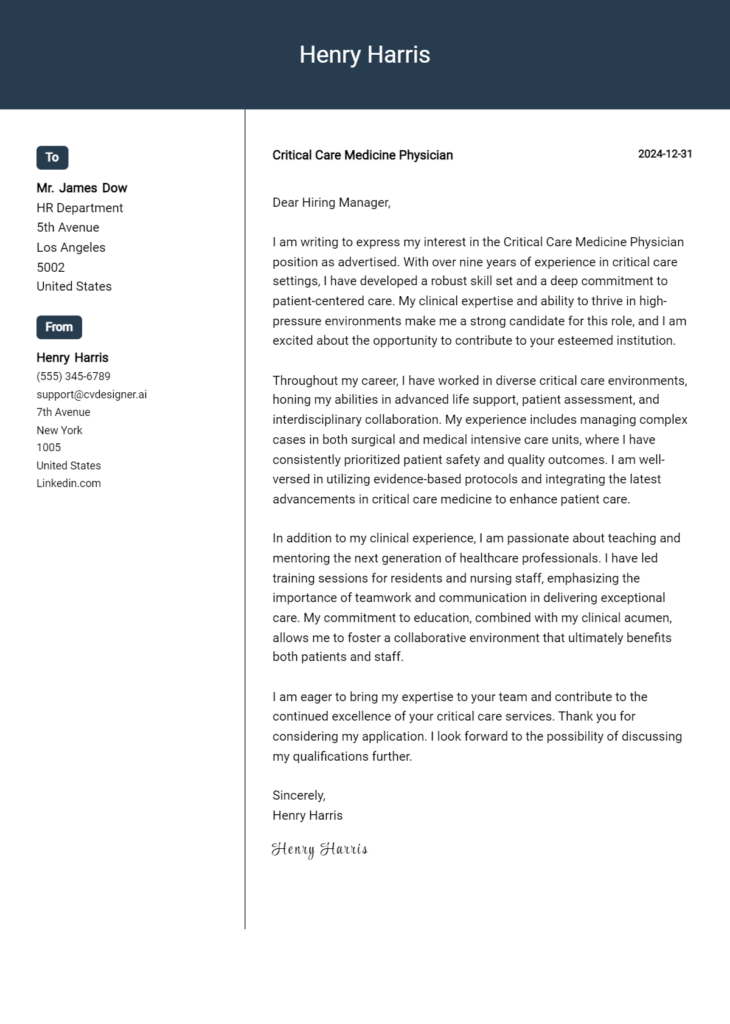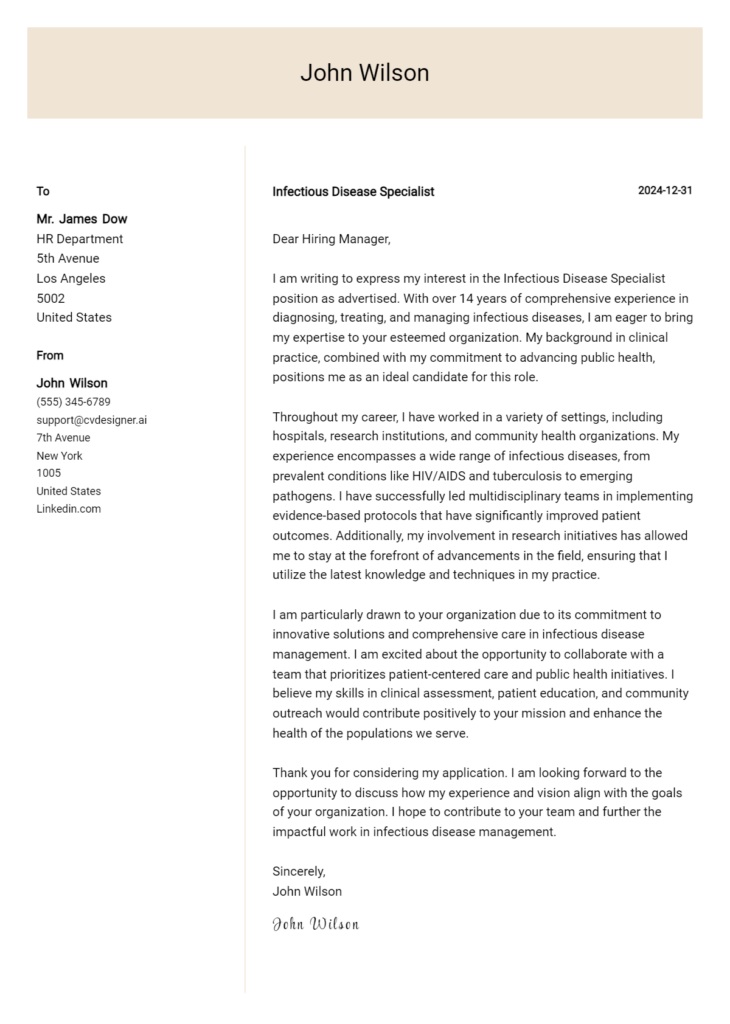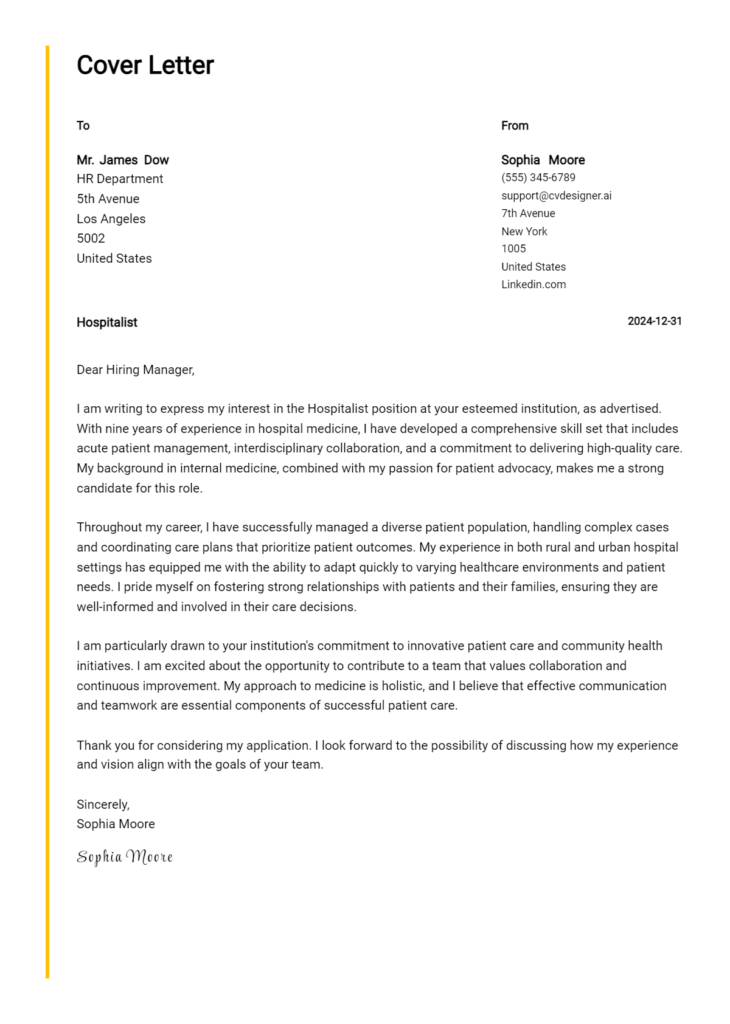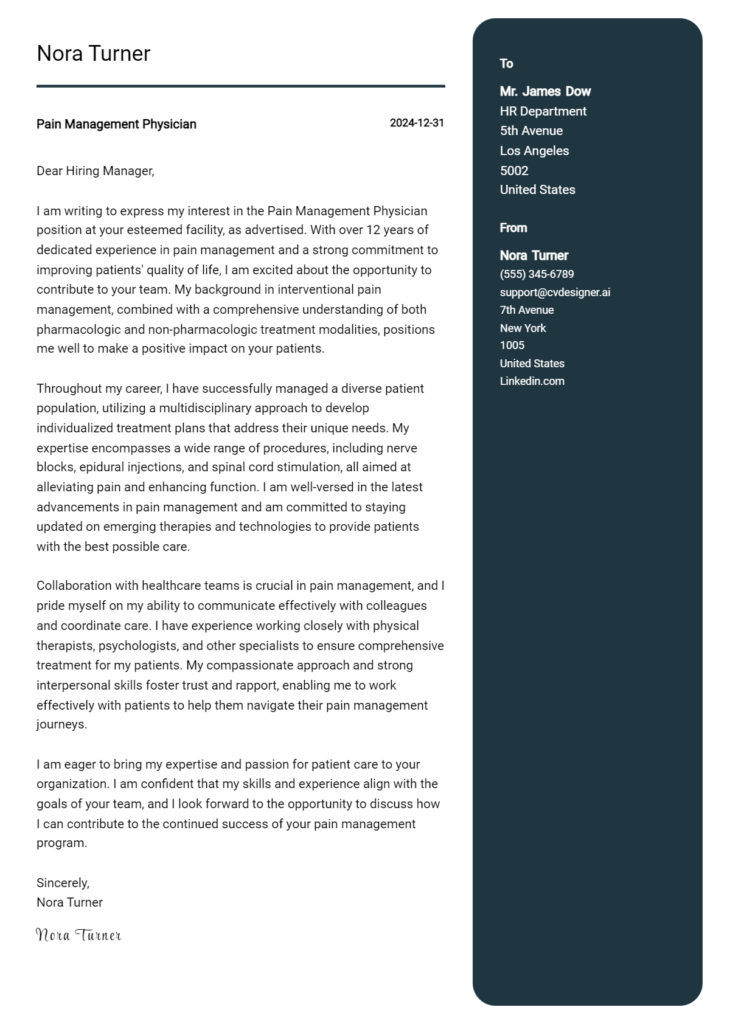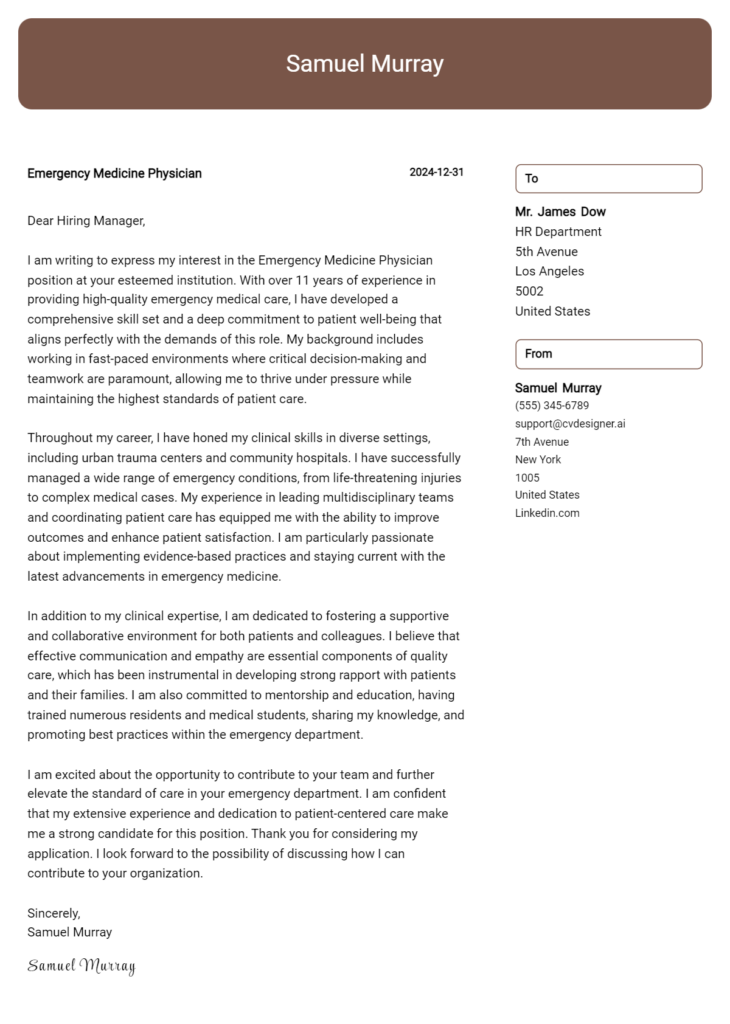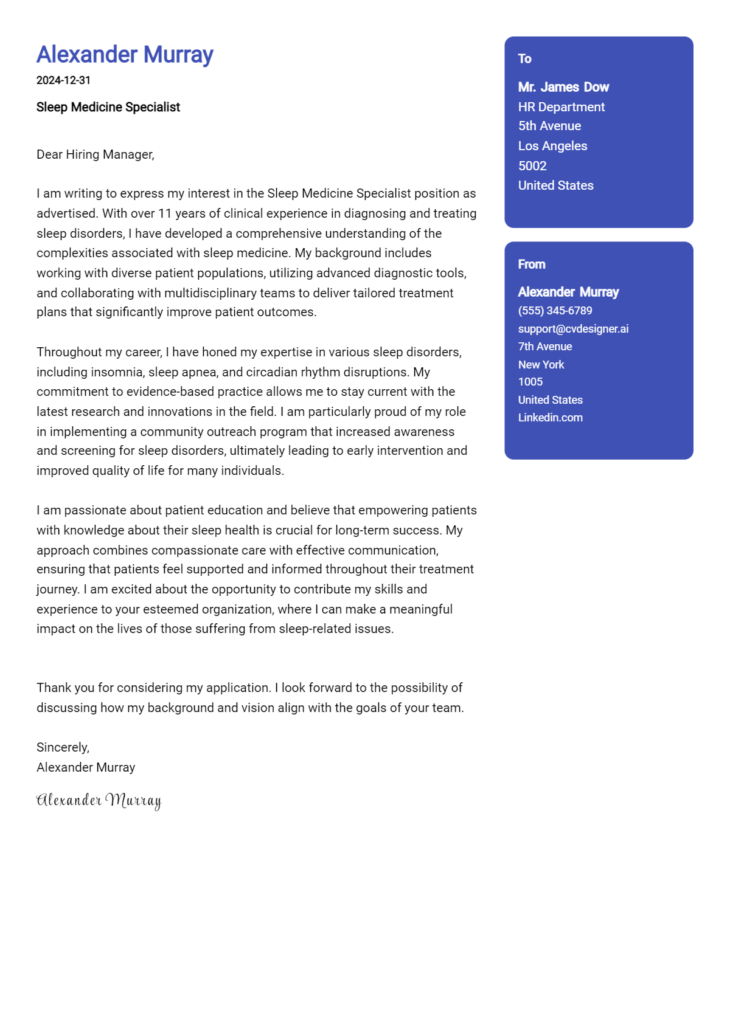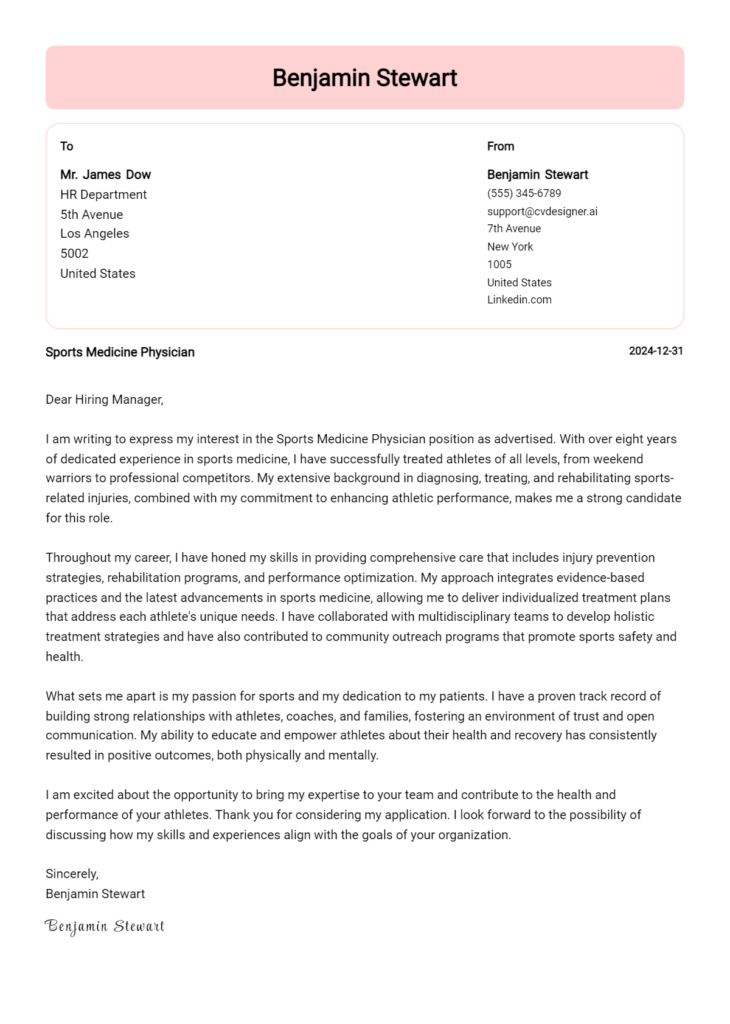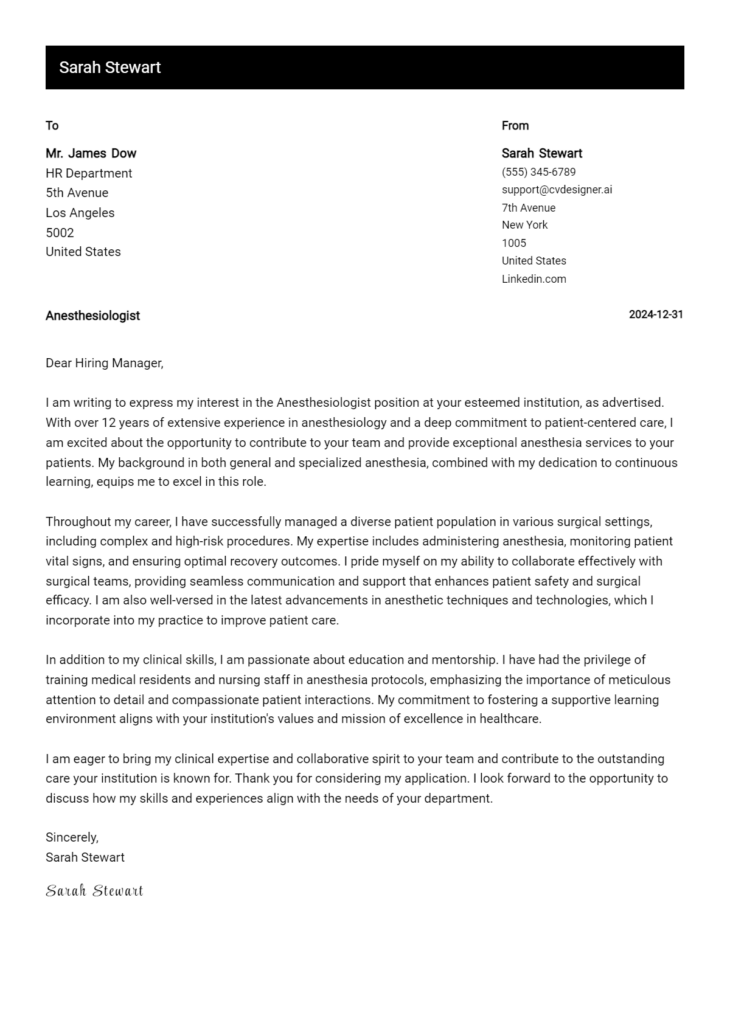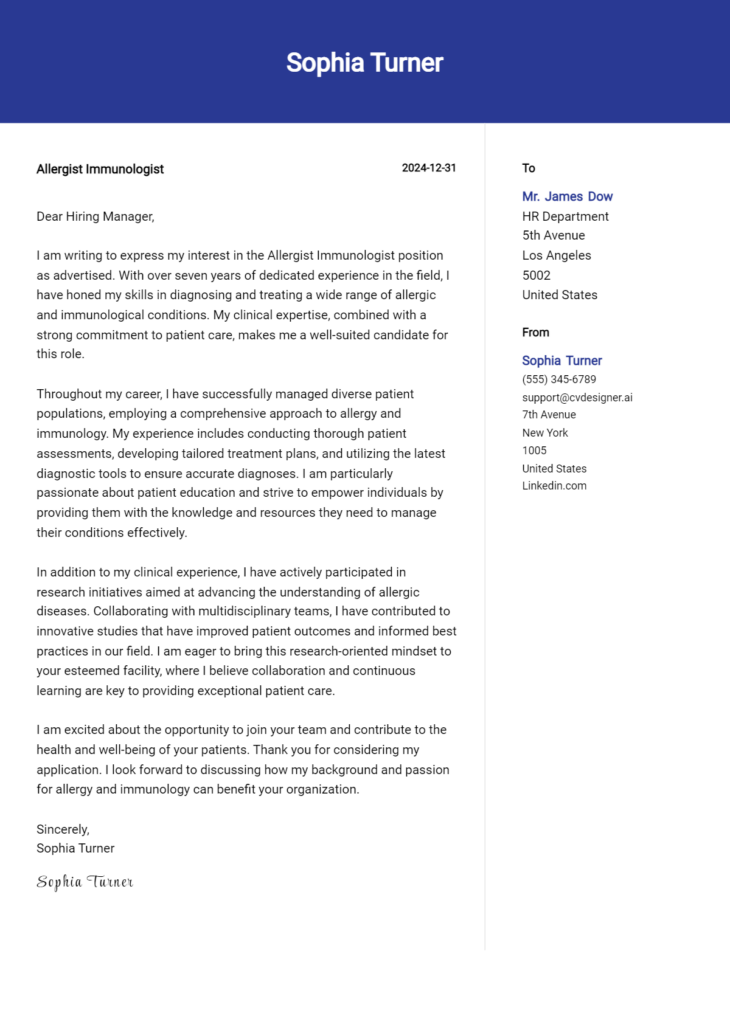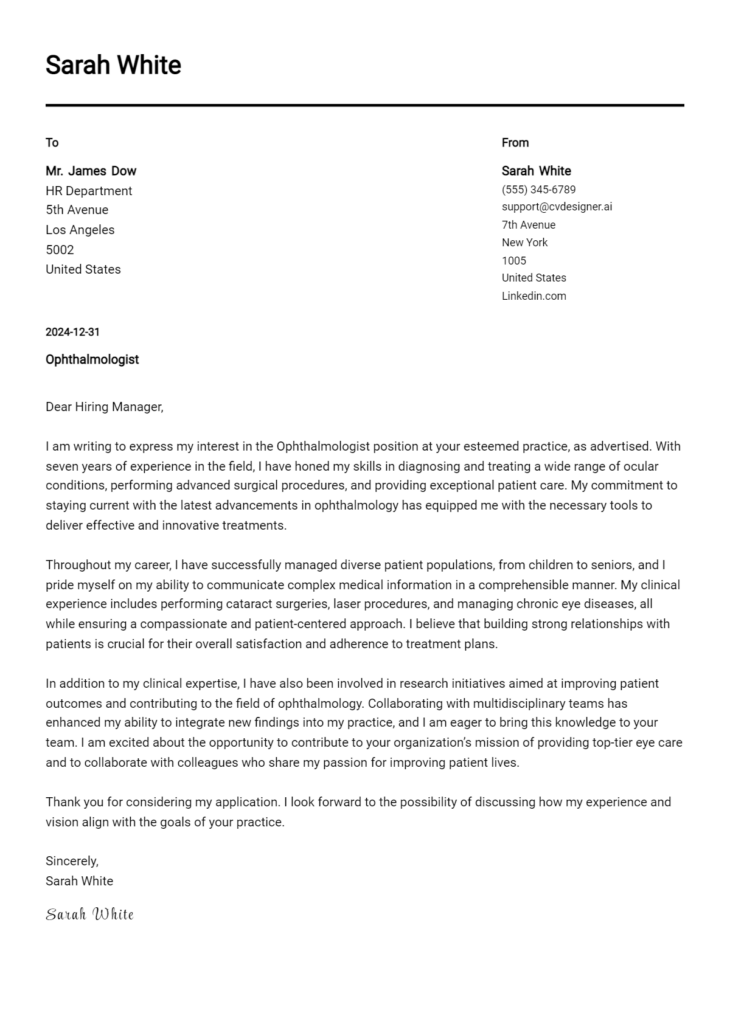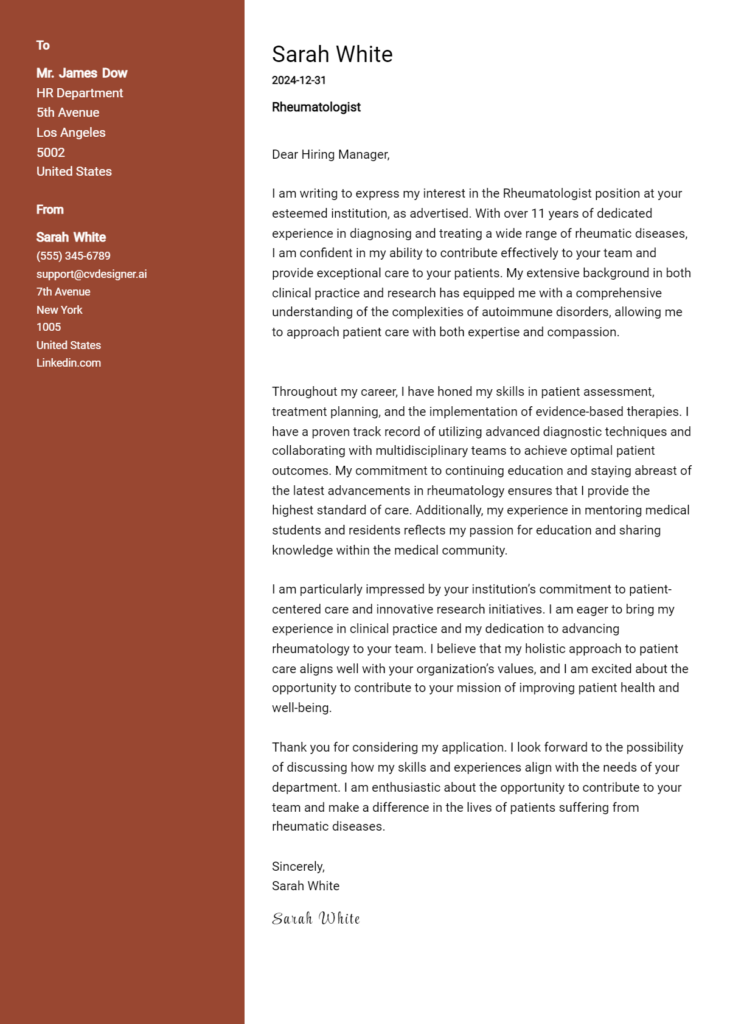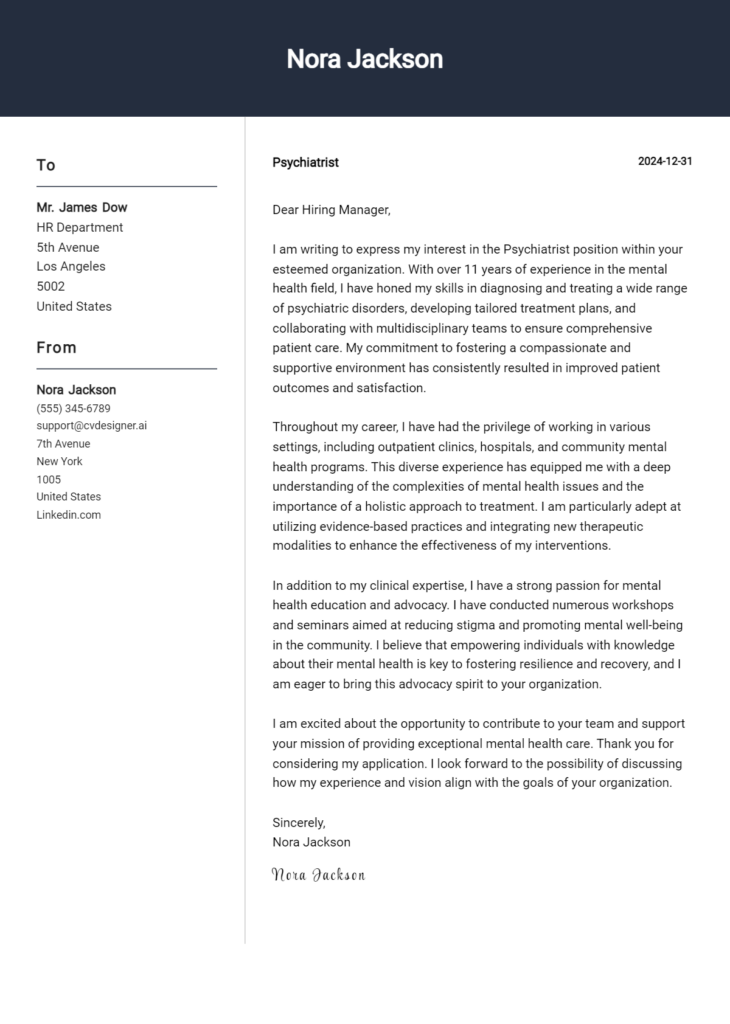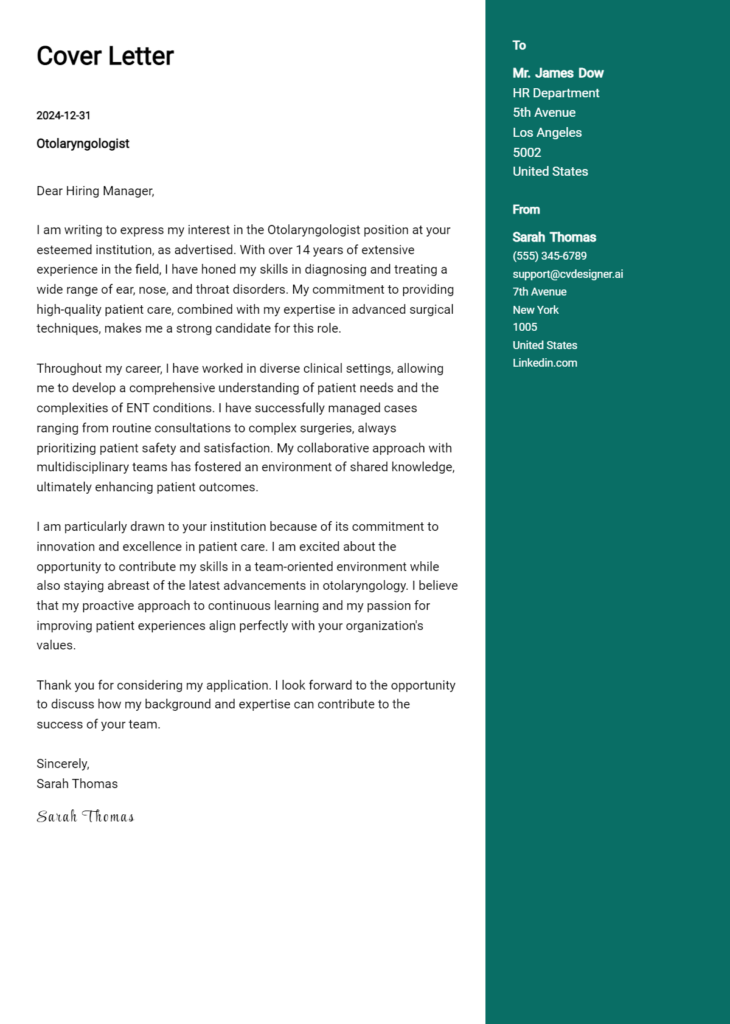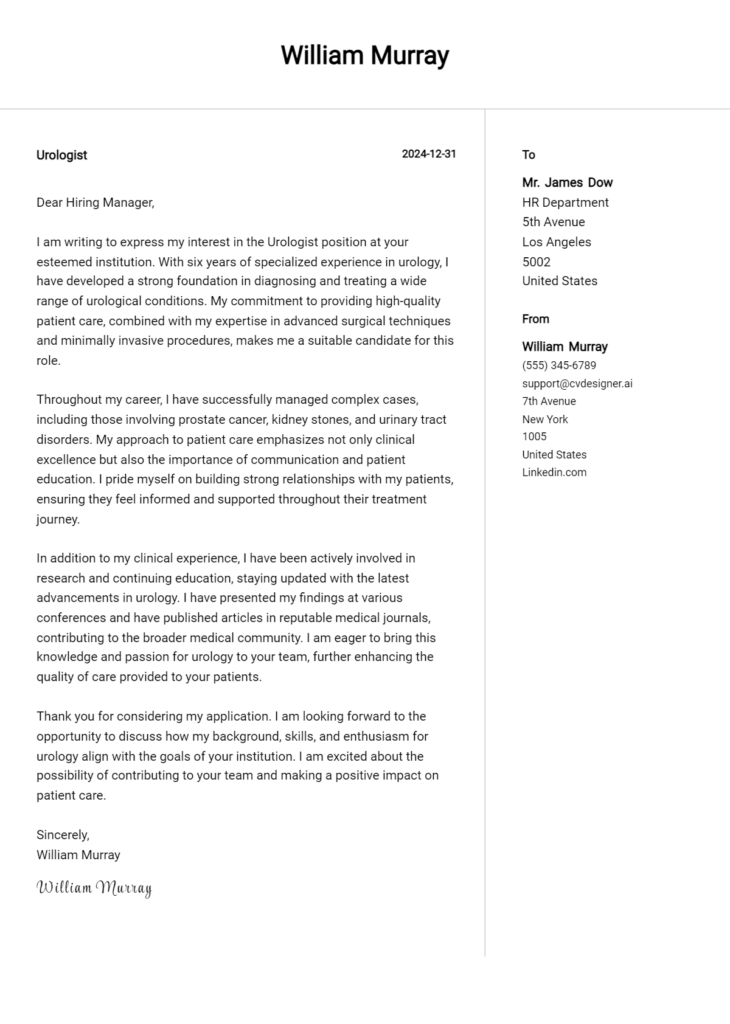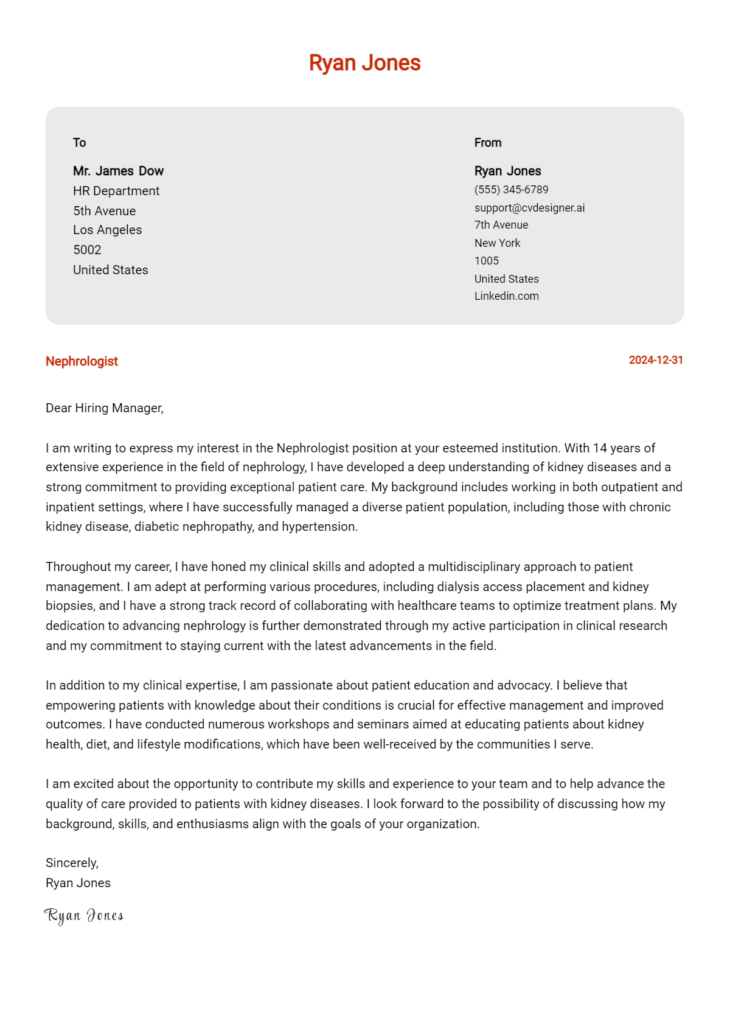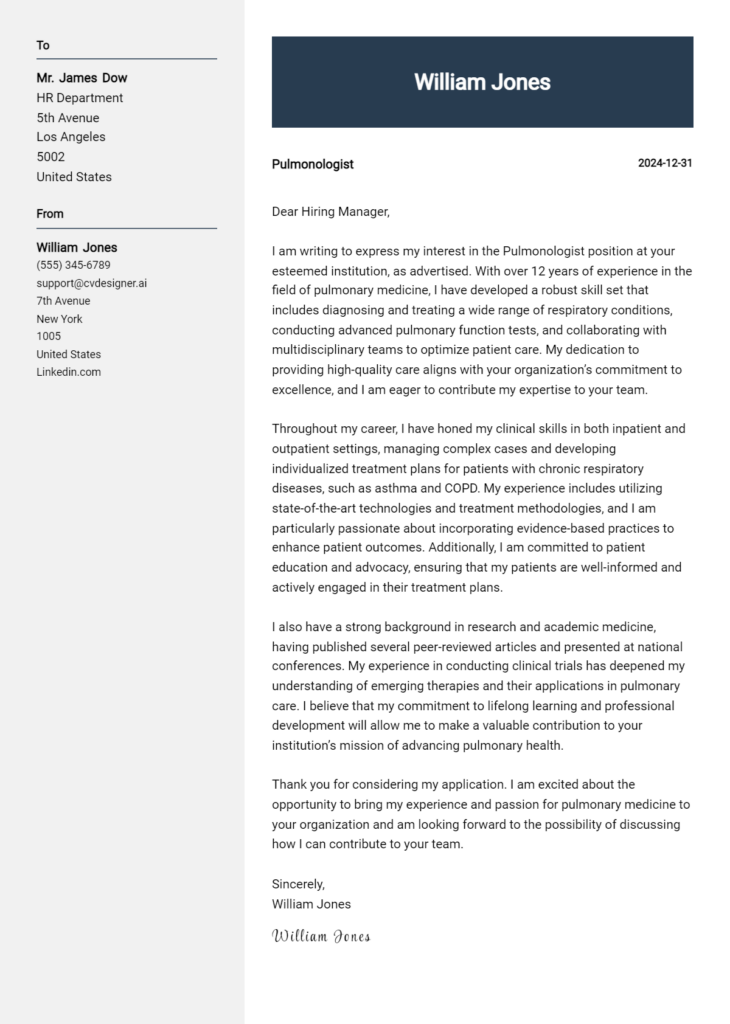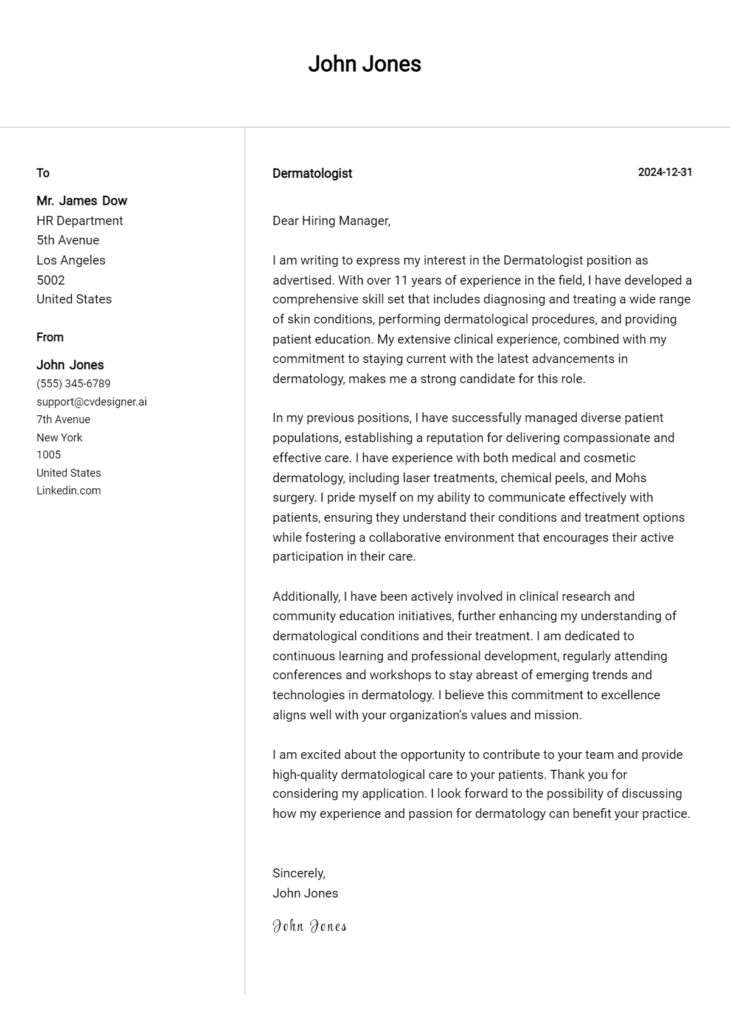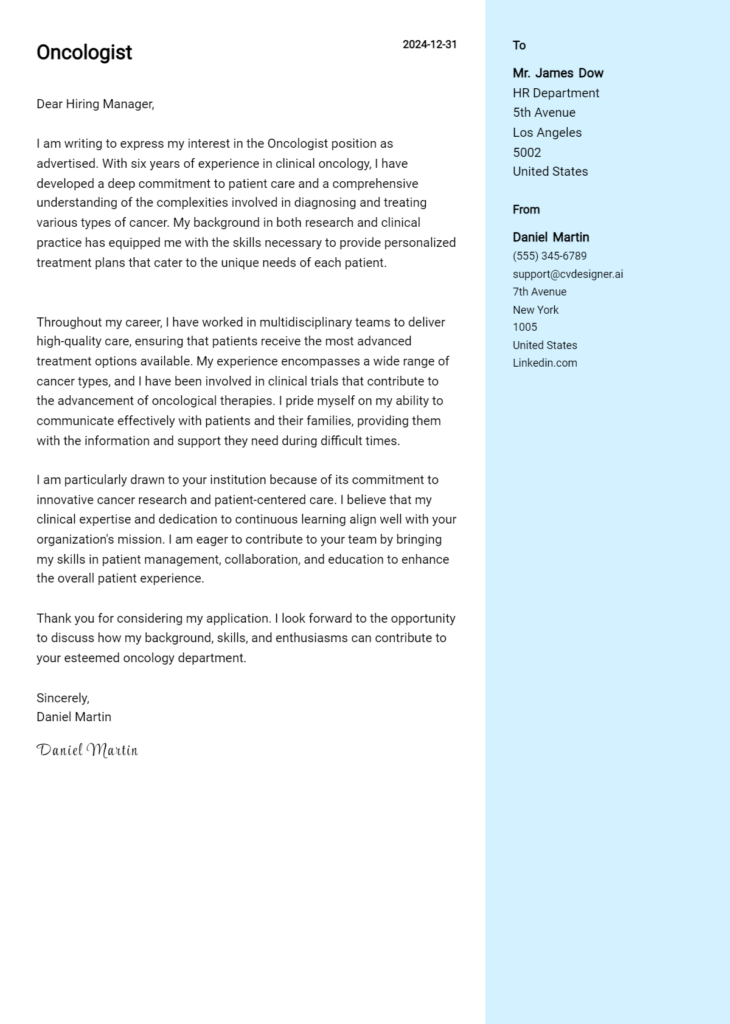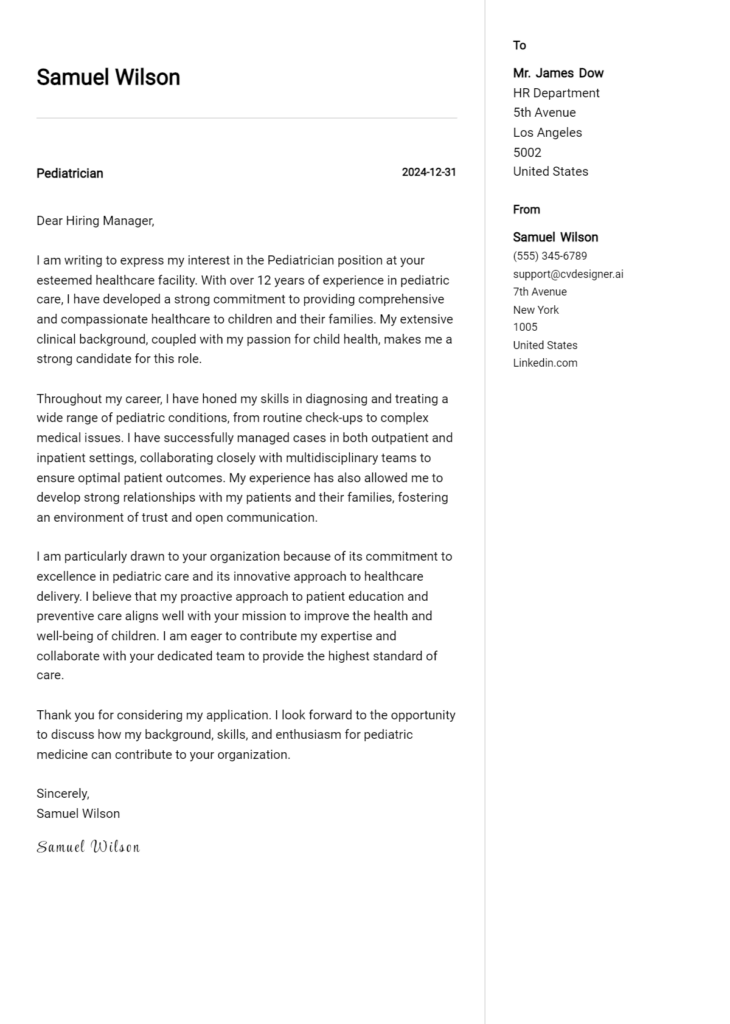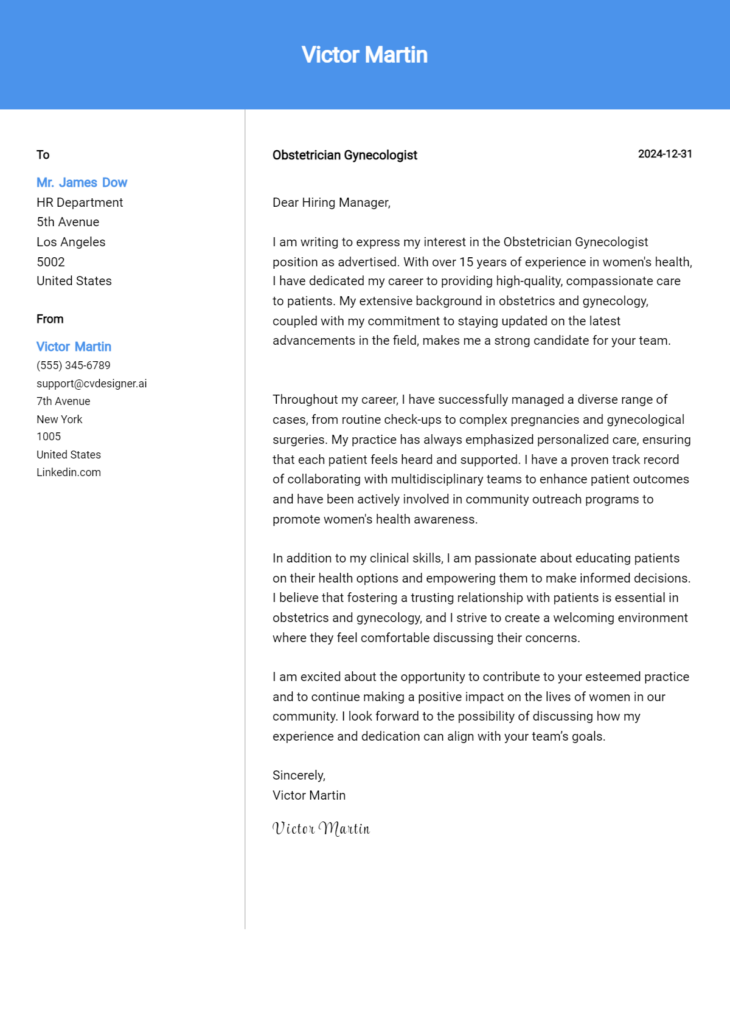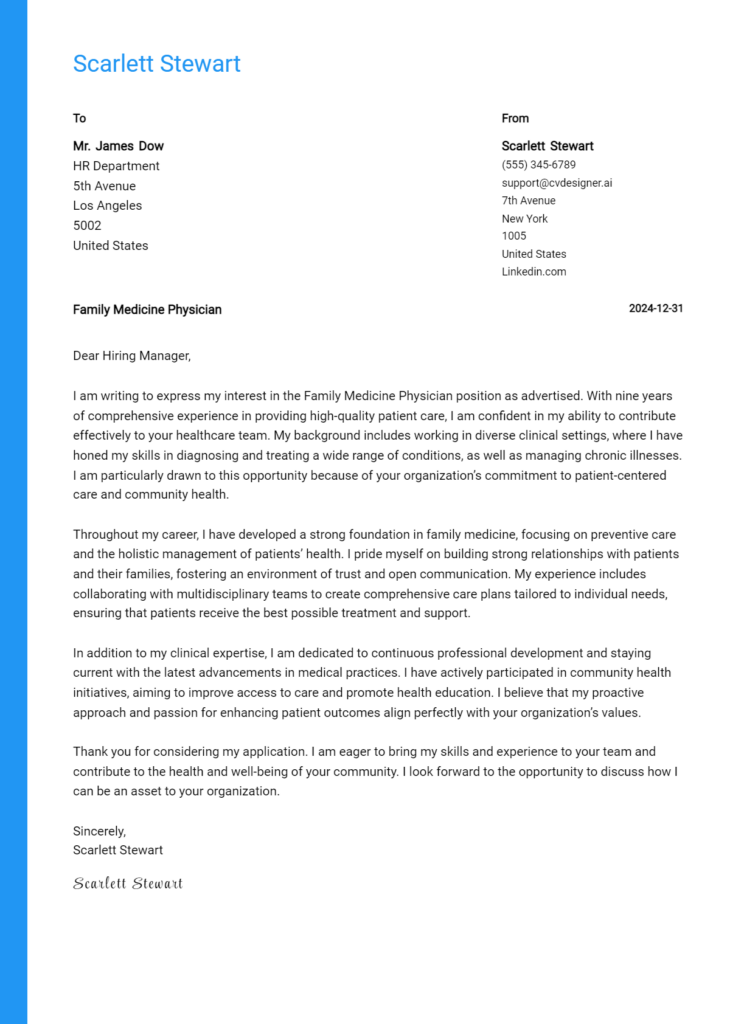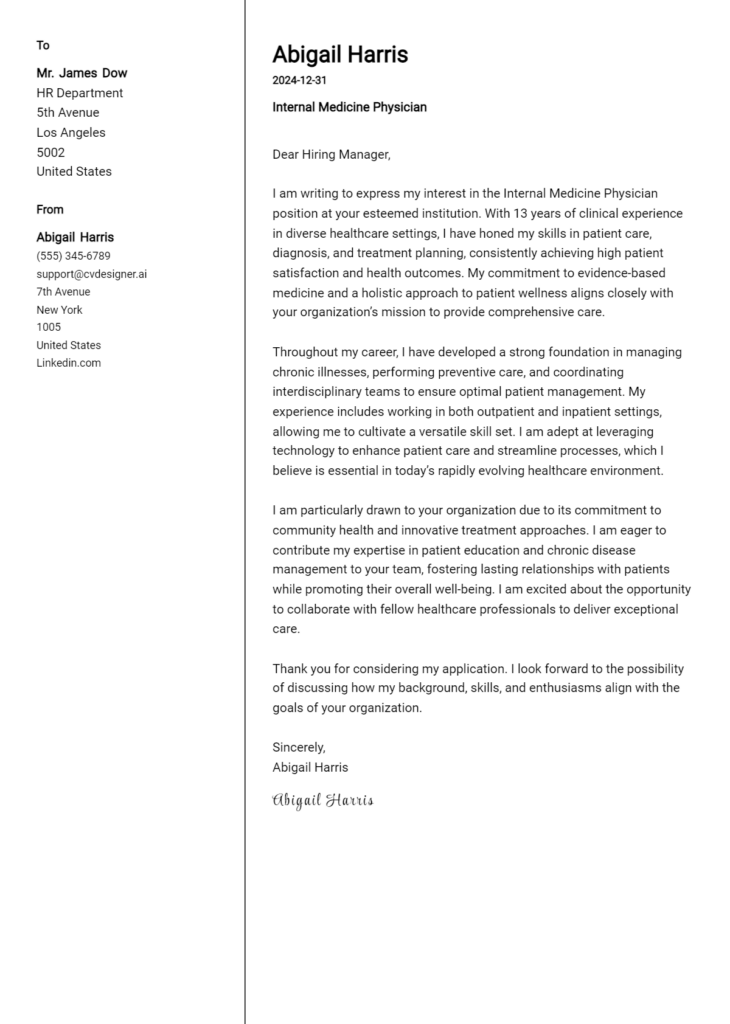Hepatologist Cover Letter Examples
Explore additional Hepatologist cover letter samples and guides and see what works for your level of experience or role.
How to Format a Hepatologist Cover Letter?
Crafting an effective cover letter is essential for a Hepatologist, as it serves as your first impression on potential employers. Given the complexities of liver disease and the need for specialized care, the way you present your qualifications can demonstrate your clinical expertise, dedication, and meticulous attention to patient care. A well-structured cover letter not only captures the hiring manager's interest but also reflects the professionalism and precision required in the medical field.
In this guide, we'll outline the key components of a professional Hepatologist cover letter, providing insights and examples specific to the field of hepatology.
We'll focus on the essential elements of your cover letter, including:
- Cover Letter Header
- Cover Letter Greeting
- Cover Letter Introduction
- Cover Letter Body
- Cover Letter Closing
Each section is crucial for effectively showcasing your qualifications and commitment to excellence in patient care. Let’s explore how to make your Hepatologist cover letter stand out.
Importance of the Cover Letter Header for a Hepatologist
The cover letter header is a crucial component of your application as a Hepatologist, as it sets the tone for the rest of your communication. A well-structured header not only provides essential information but also demonstrates your professionalism and attention to detail. The header should include your contact information, the date, and the recipient's details, ensuring that all parties can easily identify the correspondence. Clarity is paramount; a neatly formatted header creates a positive first impression and reflects your organizational skills, which are vital in the medical field.
Strong Example
Dr. Jane Smith, MD 123 Health St. Cityville, ST 12345 (555) 123-4567 jane.smith@email.com October 3, 2023 Dr. John Doe Chief of Hepatology Cityville Medical Center 456 Care Rd. Cityville, ST 12345
Weak Example
Jane S. 123 St. 10/3/23 John D. Medical Center
The Importance of a Thoughtful Cover Letter Greeting for Hepatologists
A well-crafted greeting in a cover letter is crucial as it sets the tone for the entire correspondence. It serves as the first impression a hiring manager will have of you, establishing a sense of professionalism and personalization that is essential in the competitive field of hepatology. By addressing the hiring manager directly, you demonstrate not only your attention to detail but also your genuine interest in the position and the organization. Avoiding generic greetings is key; they can come off as impersonal and may suggest a lack of effort in your application. To enhance your greeting, take the time to research the recipient's name, which can often be found on the organization's website or through LinkedIn.
Strong Greeting Example
Dear Dr. Smith,
Weak Greeting Example
To Whom It May Concern,
The Importance of a Compelling Cover Letter Introduction for a Hepatologist
A well-crafted cover letter introduction is crucial for a Hepatologist position, as it serves as the first impression to the hiring manager. This initial paragraph should capture attention, convey genuine interest in the role, and succinctly highlight the candidate's relevant skills or achievements. An engaging introduction sets the tone for the rest of the letter and can significantly influence the hiring manager's decision to consider the applicant further. Below are examples of strong and weak cover letter introductions for a Hepatologist role, illustrating the impact of effective communication.
Strong Example
Dear [Hiring Manager's Name], I am writing to express my enthusiasm for the Hepatologist position at [Hospital/Clinic Name] as advertised on [Job Board/Website]. With over ten years of specialized experience in diagnosing and treating liver diseases, including hepatic cirrhosis and viral hepatitis, I am eager to bring my expertise to your esteemed team. My recent research on non-invasive diagnostic techniques has not only improved patient outcomes but also earned recognition at the National Hepatology Conference, showcasing my commitment to advancing liver health. I am excited about the opportunity to contribute to your organization and support your mission of providing exceptional patient care.
Weak Example
To Whom It May Concern, I am applying for the Hepatologist position at [Hospital/Clinic Name]. I have some experience in this field and think I could do the job well. I have worked with liver patients before, but I am not sure how my skills fit into your team. I hope to be considered for this role.
Purpose of the Cover Letter Body for a Hepatologist
The cover letter body for a Hepatologist is a crucial component that allows the candidate to articulate their unique qualifications, relevant experiences, and the value they bring to a potential employer. This section should effectively showcase the candidate's expertise in liver diseases, including specific projects or accomplishments that highlight their proficiency. By detailing successful case studies, research contributions, or innovative treatment approaches, the candidate can demonstrate their commitment to advancing hepatology and improving patient care. A well-crafted cover letter body not only captures the attention of hiring managers but also establishes the candidate as a strong contender for the position.
Strong Example
Dear Hiring Manager, I am writing to express my interest in the Hepatologist position at [Company Name]. With over ten years of experience in diagnosing and treating liver diseases, I have successfully managed over 500 patients with chronic hepatitis C, leading to a 90% treatment success rate. At my previous institution, I spearheaded a research project that developed a novel approach to managing alcoholic liver disease, which resulted in a published paper in the Journal of Hepatology and has since been adopted in clinical practice. My commitment to patient education has also led to the implementation of workshops that significantly increased patient adherence to treatment plans by 30%. I am eager to bring my expertise in hepatology and my passion for patient-centered care to [Company Name]. Sincerely, [Your Name]
Weak Example
Dear Hiring Manager, I am interested in the Hepatologist job at your hospital. I have some experience in treating liver patients and have worked in different healthcare settings. I think I can be a good candidate for the role. I have treated patients and participated in some research. I believe I would fit well into your team. Best, [Your Name]
Importance of the Cover Letter Closing for a Hepatologist
The closing paragraph of a cover letter for a Hepatologist is crucial as it serves to summarize your qualifications, reiterate your enthusiasm for the position, and encourage the hiring committee to take the next step in the hiring process. A strong closing can leave a lasting impression and motivate the reader to review your resume and consider scheduling an interview, while a weak closing might fail to convey your passion or confidence in your suitability for the role.
Strong Example
Thank you for considering my application for the Hepatologist position. With my extensive experience in managing liver diseases and my commitment to advancing patient care through research, I am excited about the opportunity to contribute to your esteemed team. I look forward to the possibility of discussing how my background and skills align with the goals of your department. Please feel free to review my attached resume, and I hope to speak with you soon to explore this opportunity further.
Weak Example
I hope you like my application. I have some experience in hepatology. Please let me know if you want to talk. Thanks.
These tips will assist candidates in crafting an effective cover letter for a Hepatologist position. A well-written cover letter is crucial for demonstrating your technical skills, problem-solving abilities, and knowledge of the software development life cycle (SDLC), as well as your capacity for teamwork and commitment to continuous learning. By emphasizing these key areas, you can create a compelling narrative that showcases your qualifications and sets you apart from other applicants.
Tips for Writing a Cover Letter as a Hepatologist
Highlight Your Technical Skills
Clearly outline your expertise in diagnosing and treating liver diseases. Mention specific techniques or procedures you are proficient in, such as liver biopsies, imaging techniques, or advanced therapies. This not only demonstrates your qualifications but also shows your ability to contribute effectively to the team.Showcase Problem-Solving Abilities
Provide examples of challenging cases you have encountered and how you approached them. Detailing your thought process and the outcomes will illustrate your critical thinking and problem-solving skills, essential for a Hepatologist dealing with complex health issues.Demonstrate SDLC Knowledge
If applicable, mention any experience you have with software tools that support healthcare processes or patient management systems. Understanding the Software Development Life Cycle can be beneficial, especially if you have worked with electronic health records (EHR) systems or have contributed to tech solutions that enhance patient care.Emphasize Teamwork
Discuss your experience working within multidisciplinary teams. Highlight your ability to collaborate effectively with other healthcare professionals, such as surgeons, nurses, and primary care physicians, to ensure comprehensive patient care. This illustrates your interpersonal skills and dedication to team-based healthcare delivery.Express Passion for Continuous Learning
The medical field is constantly evolving, so it's important to show your commitment to staying updated with the latest research and advancements in hepatology. Mention any relevant conferences, courses, or certifications you have pursued. This demonstrates your dedication to professional development and improving patient outcomes.
For further assistance in creating your cover letter, check out these cover letter templates or use a cover letter builder to streamline the writing process.
Common Mistakes to Avoid in a Hepatologist Cover Letter
Crafting a compelling cover letter is essential for a successful job application, especially for specialized roles like that of a Hepatologist. Avoiding common mistakes can significantly enhance your chances of making a strong impression. Here are some frequent pitfalls to watch out for:
Generic Content: Using a one-size-fits-all approach can be detrimental. Tailor your cover letter to reflect the specific requirements of the Hepatologist position. Research the institution and mention how your skills align with their needs.
Neglecting Formatting: An unprofessional layout can distract from your qualifications. Follow a clear cover letter format to ensure your letter is visually appealing and easy to read.
Overly Long Letters: Hiring managers often have limited time. Keep your cover letter concise, ideally one page, focusing on your most relevant experiences and achievements.
Lack of Specific Examples: Failing to provide concrete examples of your expertise in hepatology can weaken your case. Highlight specific cases or research that demonstrate your skills and successes.
Ignoring the Job Description: Not addressing the key requirements outlined in the job description can lead to missed opportunities. Use keywords from the job listing to showcase how your qualifications meet the employer's expectations.
Spelling and Grammar Errors: Mistakes in grammar or spelling can undermine your professionalism. Always proofread your letter or seek assistance from a peer to ensure it's error-free.
Forgetting to Include Contact Information: Omitting your contact details can create unnecessary barriers for potential employers. Ensure your name, email, and phone number are easy to find at the top of your letter.
By steering clear of these mistakes, you can create a powerful cover letter that stands out. For more guidance, check out these cover letter examples to help you refine your writing.
Cover Letter FAQs for Hepatologist
What should I include in my cover letter as a Hepatologist?
In your cover letter, emphasize your specialized training in hepatology, including your residency and fellowship experiences. Highlight your expertise in diagnosing and treating liver-related diseases, and mention any specific procedures or technologies you are proficient in, such as liver biopsies or advanced imaging techniques. Additionally, discuss your research interests or any publications in the field, as well as your commitment to patient care and education. Tailor your letter to the specific institution you are applying to, showcasing your understanding of their values and how your skills align with their needs.
How can I demonstrate my passion for hepatology in my cover letter?
To convey your passion for hepatology, share personal anecdotes or experiences that led you to this specialty. Discuss any volunteer work, internships, or projects related to liver disease that ignited your interest. Emphasize your commitment to advancing the field, whether through research, attending conferences, or collaborating with multidisciplinary teams. You can also express your enthusiasm for patient interactions, particularly in educating patients about liver health. By illustrating your dedication and proactive engagement in hepatology, you will make a compelling case for your candidacy.
Should I include my research experience in my cover letter?
Absolutely! Research experience is particularly valuable in the field of hepatology, where advancements are continually being made in understanding liver diseases and treatments. Mention any relevant research projects, clinical trials, or publications that demonstrate your ability to contribute to the academic and clinical aspects of hepatology. Highlight the skills you gained during your research, such as data analysis, critical thinking, or collaboration with other specialists. This not only showcases your expertise but also reflects your commitment to evidence-based medicine and continuous learning, making you a strong candidate.
How long should my cover letter be?
A cover letter for a Hepatologist should ideally be one page long, comprising three to four paragraphs. This length allows you to succinctly convey your qualifications, experiences, and enthusiasm without overwhelming the reader. Focus on clarity and relevance—ensure each paragraph addresses a specific aspect of your candidacy, such as your clinical skills, research background, and commitment to patient care. Use concise language and avoid unnecessary jargon, aiming for a professional tone that reflects your personality and passion for hepatology, while leaving room for your CV to provide further details.
Build your Cover Letter in minutes
Use an AI-powered cover letter builder and have your letter done in 5 minutes. Just select your template and our software will guide you through the process.

